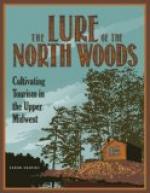“My father, going south on a holiday, met my mother and gave up his post when they were married. She had a little money, enough to open a small store, and for her sake he started business in a new wooden town. He did not like the towns, and I know when I got older that he often longed for the wild North, but although the place grew and the business prospered, he could not spare the time and money to look for the lode. He wanted to give my brother a good education and start him well, and after a time I was sent to a university.”
“That explains something,” Thirlwell remarked, and then pulling himself up, added: “If you take proper appliances, a prospecting expedition costs much. But did your father often talk about the lode?”
“No; not unless it was to me.”
“But why did he tell you and not your brother?”
“George was very practical; I was romantic and my father something of a dreamer. We lived happily at home, but I felt that he needed sympathy that he did not get. I think now my mother knew he longed for the North, and was afraid the longing might grow too strong and draw him back. When he did speak of the silver she smiled. I suppose when you have known the wilderness its charm is strong?”
She stopped and her face was gravely thoughtful as she looked across the shining water towards the faint blur of a pine forest on a distant point, and Thirlwell felt as if they had been suddenly united by a bond of understanding.
“Yes,” he said. “It’s a stern country and one has much to bear; but it calls. One fears the hardships, cold, and danger—but one goes.”
Agatha looked up quietly, but he noted the gleam in her eyes.
“You know! Well, you can imagine what it cost my father to resist the call, but he did resist for many years. He loved my mother, but I think he hated the growing town; then there was the dream of riches that might be his. He was not greedy, and my brother did not need money. George had a talent for business and his employers soon promoted him; but I was fond of science, and it was my father’s ambition that I should make independent researches and not be forced to work for pay.”
She hesitated, and then went on: “Perhaps I am boring you, but I wanted you to understand what his duty must have cost. You see, you only knew him in the bush, and after he went back I noted a difference in his letters. They were sometimes strange; he seemed to be hiding things. I think he felt the disappointment keenly and lost heart.”
Thirlwell saw she suspected something, and replied: “Disappointment is often numbing; but your father never lost his faith in the lode.”
“Nor have I lost mine,” said Agatha. “But we will not talk about that yet. He brought us up and started us well; then my mother died, and nobody had any further claim on him. His duty was done, and though he was getting old, he went back to the North. Well, I have told you part of his story, and you know the rest.”




